Chuin Aloo Badi Besara is a traditional Odia curry made with drumsticks, potatoes, brinjals, and crispy badi simmered in a tangy mustard-cumin gravy. So simple, rustic, and full of flavor.
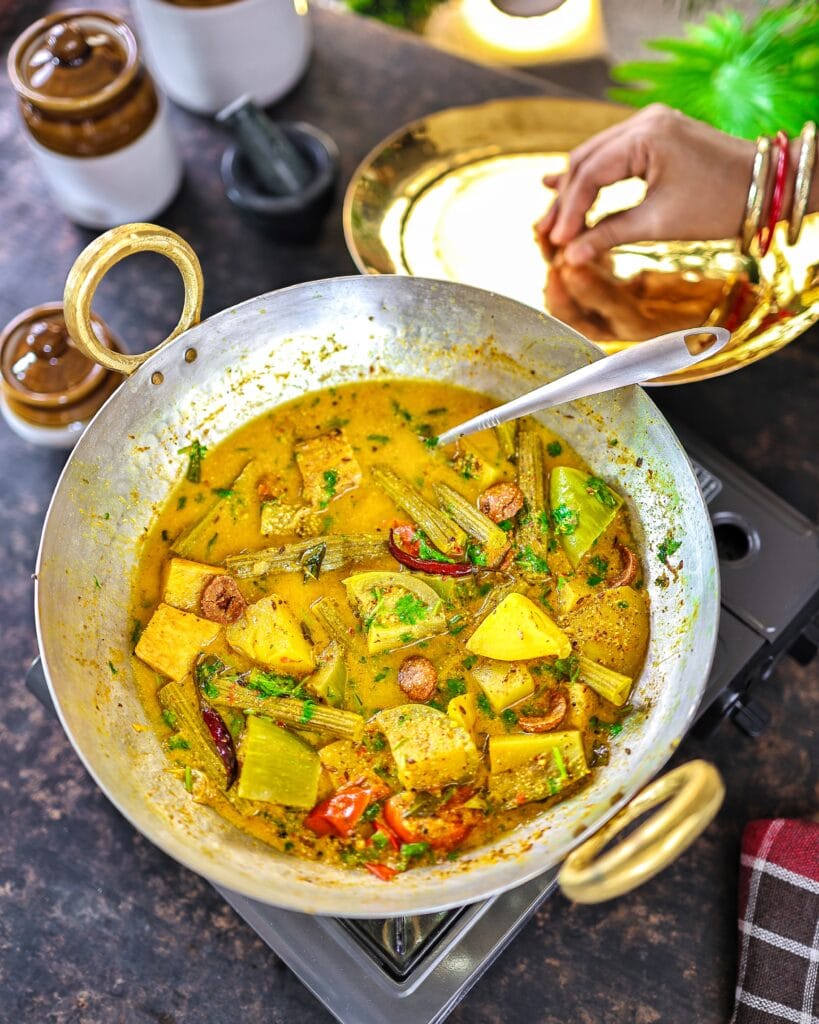
In the fast-paced world of modern cooking, traditional recipes often fade quietly into the background. Especially those that don’t make flashy appearances on restaurant menus or social media feeds. Odisha, a land of rich culinary heritage, has a treasure trove of such dishes, deeply rooted in culture, memory, and community. Among them is a humble yet soulful curry called Chuin Aloo Badi Besara. It is a mixed vegetable curry enriched with crispy lentil dumplings called badi.
Chuin Aloo Badi Besara: A Taste of Simplicity
This rustic dish reflects the essence of Odia home cooking—simple, seasonal ingredients elevated with time-honored techniques. In most traditional Odia households, badi was once a pantry staple, made lovingly by grandmothers during the summer and sun-dried for year-round use. These tiny lentil nuggets were not just a protein source but a symbol of thoughtful cooking, often paired with whatever vegetables were available.
Sadly, as convenience foods and fast lifestyles took over, the practice of making badi at home declined. And with it, the dishes that celebrated it began to disappear from regular meals.
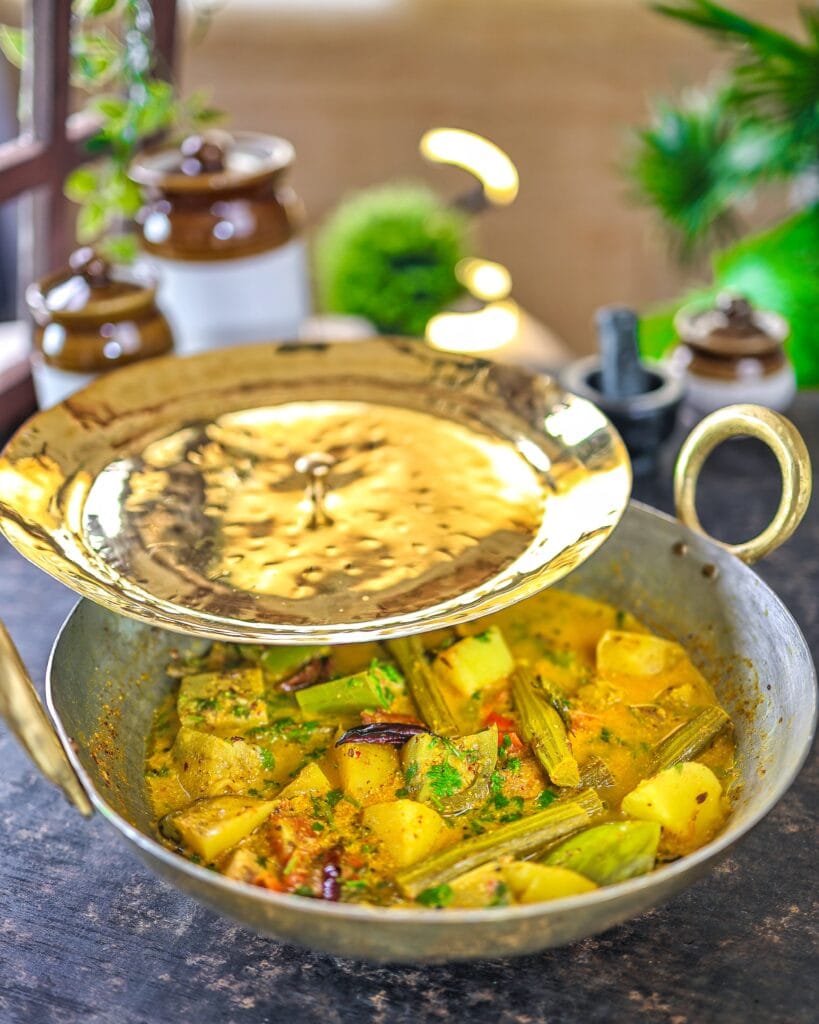
The hero ingredient: Badi
What makes this besara special is its texture contrast. The crispy, golden-fried badi soaks up the mustard-spiced gravy yet retains a satisfying bite. It’s a reminder of how Odia cuisine often balances textures and flavors with elegance—spicy, earthy, mildly tangy, and wholly comforting.
This curry typically uses seasonal vegetables like potatoes, drumsticks, brinjal, and tomatoes. The signature Odia touch is in the spice paste—a bold blend of mustard seeds, cumin, garlic, and dry red chilies, which gives the gravy its sharp yet warm depth.
The forgotten charm of a Tadka!
Most Odia curry is incomplete without that final tadka— a tempering of garlic, dry red chilies, cumin seeds, and fresh curry leaves in pungent mustard oil. This simple finishing step transforms the dish, infusing it with an irresistible aroma that brings back memories of childhood lunches and lazy Sunday meals.
Why do we need to revisit these recipes?
Dishes like Chuin Aloo Badi Besara are more than just food—they’re living memories. They connect us to our roots, to the hands that once prepared them, and to a way of eating that celebrated local produce, mindful cooking, and seasonal rhythm. As more of these recipes fade from everyday kitchens, there’s an urgent need to preserve and revive them. It is not just for nostalgia but for the richness they add to our culinary identity.

So let’s cook ‘Chuin Aloo Badi Besara’ together –
Whether you’re from Odisha or simply a curious foodie, this dish is a must-try. It’s simple, wholesome, and packed with bold, nostalgic flavors. Paired with a bowl of hot steamed rice, this rustic besara tarkari becomes a comforting, soul-satisfying meal. Once a staple in Odia households, it’s a reminder of the rich culinary traditions that deserve a place in our modern kitchens. Just perfect for both everyday lunches and any special spreads, bringing the true essence of Odisha to your plate.
👉 Find the full recipe below and let the aroma of mustard and garlic take you back in time.
📖 RECIPE CARD
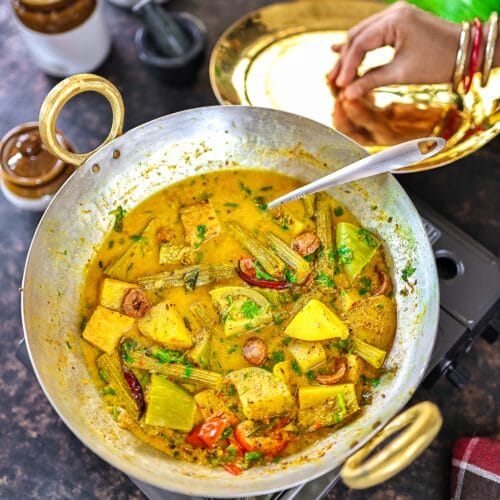
Chuin Aloo Badi Besara
Ingredients
- 3 large potatoes cubed
- 4 drumsticks cut into 3-inch pieces
- 1 large brinjal eggplant, cubed
- 2 medium tomatoes cubed
- ¼ cup badi sun-dried lentil dumplings
- 1 tbsp mustard seeds
- 1 tbsp cumin seeds
- 5-6 garlic cloves
- 2 dry red chilies
- 1 tbsp turmeric powder
- A few coriander leaves chopped
- 2 sprigs curry leaves
- Salt to taste
- Water as needed
- 3 tbsp mustard oil
Instructions
- Heat 2 tablespoons of mustard oil in a kadhai (wok) over medium heat.
- Fry the badis until light golden. Remove and set aside.
- In the same kadhai, add mustard seeds and cumin seeds (pancha phutana). Let them crackle.
- Add the cubed potatoes and drumsticks, along with turmeric powder and salt. Sauté for a few minutes.
- Meanwhile, grind mustard seeds, cumin seeds, dry red chilies, and garlic cloves into a smooth paste using a mixer grinder.
- Add the ground paste to the kadhai and sauté everything until the raw aroma disappears.
- Pour in about 2 glasses of water. Cover the kadhai with a lid and bring it to a boil.
- Add the brinjal and tomato cubes. Mix well, cover again, and cook until the vegetables are tender and the gravy thickens.
- In a separate small pan (tadka pan), heat 1 tablespoon of mustard oil.
- Add garlic cloves, curry leaves, dry red chilies, and cumin seeds. Let them crackle.
- Pour this tempering into the cooked curry (tarkari) and mix gently.
- Cook for another minute, then turn off the heat.
- Finally, add the fried badis and chopped coriander leaves.
- Serve hot with steamed rice.
Notes
- Chuin refers to drumsticks, which are highly nutritious and add a unique flavor to the dish. Make sure they are tender and fresh for the best results.
- Badi (sun-dried lentil dumplings) can be store-bought or homemade. Fry them lightly until golden to enhance their flavor and prevent them from turning soggy in the curry.
- The mustard-cumin-garlic paste is the heart of this dish. Ensure it’s ground to a smooth consistency for a balanced, creamy gravy.
- Use mustard oil for an authentic Odia flavor—it adds a sharp, pungent note that complements the mustard gravy beautifully.
- Adjust the water based on the desired consistency of the curry. Traditionally, it’s slightly thick but not dry.
- This dish tastes even better after a few hours as the flavors deepen, making it great for meal prep.

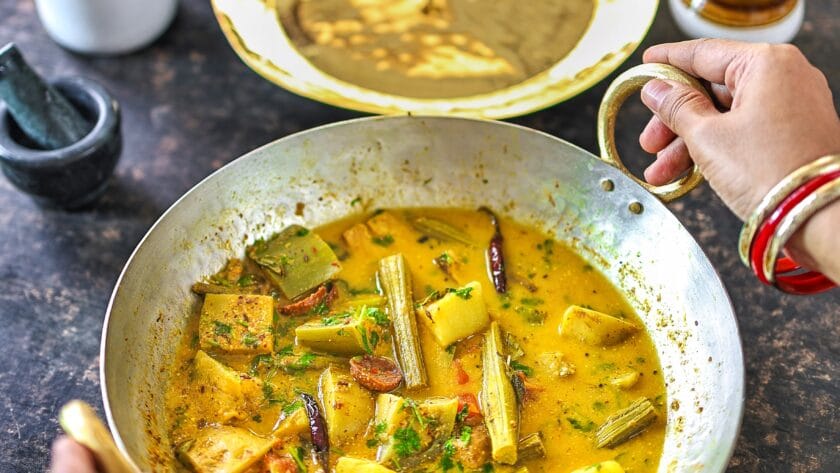


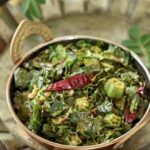
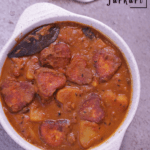
YOur insight into odia cuisine is unparalelled.Each recipe I go through is simply amazing. We love how beautiful this mustard curry look and I am sure tastes equally great as well.
I must say this badi recipe is a keeper of a recipe. I love the flavours here, and I need to find the badi and make some. It is healthy and delicious. Thanks for sharing.
Love how hearty this curry looks. As you rightly mentioned many traditional and authentic recipes are forgotten or lost in this fast paced lifestyle. Brilliant flavors here, potatoes, drumsticks and badi’s can imagine the heartiness of the curry!!! Will definitely give this a try!
The odia style badi curry is just wow. Like the final addition of Tadka in mustard oil . In all the cuisines,the Tadka is yhe crown of the Dish. Love this humble and traditional recipe from Odia kitchen.
Chuin Aloo Badi Besara Looks incredible. I am always in awe of the simplicity of Odia cuisine . This curry looks wholesome and delish . I love curries and definitely going to try this soon. So many recipes are lost and to come across one is a treasure.